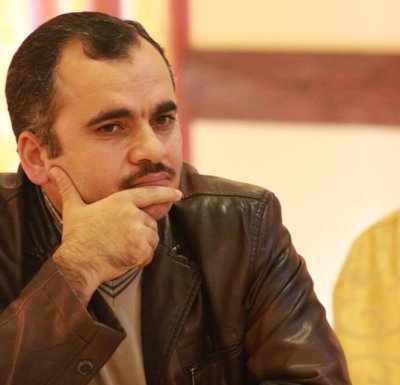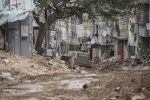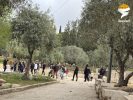The Palestinian Nakba and the Israeli independence both commemorated their seventy-fifth anniversary this year. The disappearance of Palestinians has allowed the occupation to establish its state with a clear Jewish majority. Erasing Palestinian culture made it possible to pour historical memory into the lands of the new state claiming that the Palestinians were not present in it although without the Nakba it would not have been possible to establish the new state. This forces Israelis to acknowledge the Nakba is the reason for the existence of their state.
Benzion Netanyahu one of the historiographers of the Zionist movement advised his son the current prime minister that “As long as the Palestinians consider our Independence Day a day for their catastrophe our conflict with them will not be resolved.” This piece of advice carries historical influence for both Palestinians and Israelis.
As a result of this belief Israel has consistently emphasized a narrative that alleges that the Nakba was an artificial issue created by Palestinians and Arabs and Zionist gangs had no role in it.
Historical testimonies however showed that these gangs practiced psychological warfare on Palestinians and spread terror among them. They carried out ground and air attacks to force them to leave their homes terrorized people who were safe in their homes slaughtered thousands of them and forced hundreds of thousands to leave their country; all as per explicit and direct orders from then Prime Minister Ben-Gurion.
Zionist gangs started terrorizing Palestinians to force them to leave their homes and to empty the cities and villages they live in. They claimed that their crimes that killed many Palestinians came in response to Palestinian attacks. There were many gangs including Haganah Irgun and Stern.
Zionist terrorist massacres continued between April and May of 1948 and aimed at achieving some goals the most important of which was the speedy control of the area of the Jewish state stipulated in the partition decision emptying Palestine of the largest possible number of its citizens securing the land and sea transportation network and preserving the settlements inside and outside the Jewish part of the partition decision. These goals also included the Jews taking over villages and cities located within the borders of their state and contributing to the settlement of a large number of Jews in the emptied villages and cities as well as strengthening the military position of the Zionist gangs that later formed the Israeli army.
These massacres show that the Israeli military strategy was based on attacking and emptying Palestine of its citizens by destroying villages and in the case of resistance annihilating them expelling residents outside the borders of the state occupying isolated Palestinian neighborhoods and controlling the ways to exit and enter cities.
Israeli terrorism was manifested in the destruction of 420 villages whose Palestinian residents were forcibly evicted or fled because of massacres or artillery and aerial bombardment. These villages constituted 85 per cent of the Palestinian villages in the areas that became part of the borders of the occupying state by the end of the war and 50 per cent of the total number of Palestinian villages that witnessed military operations bomb explosions planned attacks and massacres that sowed panic among the Palestinians and succeeded in evacuating villages and cities.
The most important element in these crimes was that they were all premeditated and planned. They were premeditatedly carried out by organized Israeli military units. Villages that did not show any resistance or harbor any regular or irregular forces were burned and destroyed and their people exiled. Twenty-five massacres were committed which wiped nearly 400 villages from existence and uprooted nearly 960000 Palestinian refugees from their homeland.
Palestinians commemorate the Nakba at the same time Israel commemorates its founding anniversary. This embodies the scale of the catastrophe that befell the Palestinian people because of the Zionist movement’s policy that does not see them as a national group with the right to self-determination. Therefore Nakba Day represents a continuous and documented historical catastrophe based on which the occupying state was built. Seventy-five years after the Nakba took place Palestinians are still learning the dimensions of this catastrophe the ways things went the violence that occurred and its long-term consequences for the Palestinians.
Before the 1948 war historical Palestine was home to 1.4 million Palestinians and 600000 Jews under the British mandate. At the same time there are 900000 Palestinians who lived in the area that would become the occupying state at the end of the war. Many Palestinians between 700000-750000 were forcibly deported outside the mandate areas towards Syria Lebanon Egypt Jordan or the West Bank and Gaza Strip. By the end of the war about 156000 Palestinians remained within the borders of Israel including 46000 internal refugees who were expelled from their homes and lands and forced to continue living as refugees within occupied Palestine.
In addition to displacing Palestinians and seizing their lands the Nakba constituted the annihilation of a national cultural dynamic and vital society that has deep roots in Palestine. In the 1930s and 1940s Haifa Jaffa Jerusalem Acre Gaza and other cities were bustling centers for Palestinian business from lawyers’ and accountants’ offices to cinemas theatres cafes restaurants hotels libraries beaches sports clubs and cultural associations but the Nakba stopped this evolving process.
Palestinians do not see their Nakba as a historical event only but rather a life experience that goes on in every confrontation with an occupying soldier at every checkpoint. It goes on through confiscating lands restricting movement and waging wars on Gaza. Thus the trauma of 1948 continues to form a pillar of the Palestinian identity and their collective memory and they return from time to time to the Nakba as a decisive moment.
Meanwhile for 75 years there have been countless opportunities for the occupation to correct the injustices committed against Palestinians by recognizing their catastrophe and tragedy and their national rights compensate them for their losses and return refugees to their homeland but the occupation continues with its arrogance.
– Dr. Adnan Abu Amer heads the Political Science and Media Department of Umma University Open Education in Gaza. His article appeared in MEMO.












